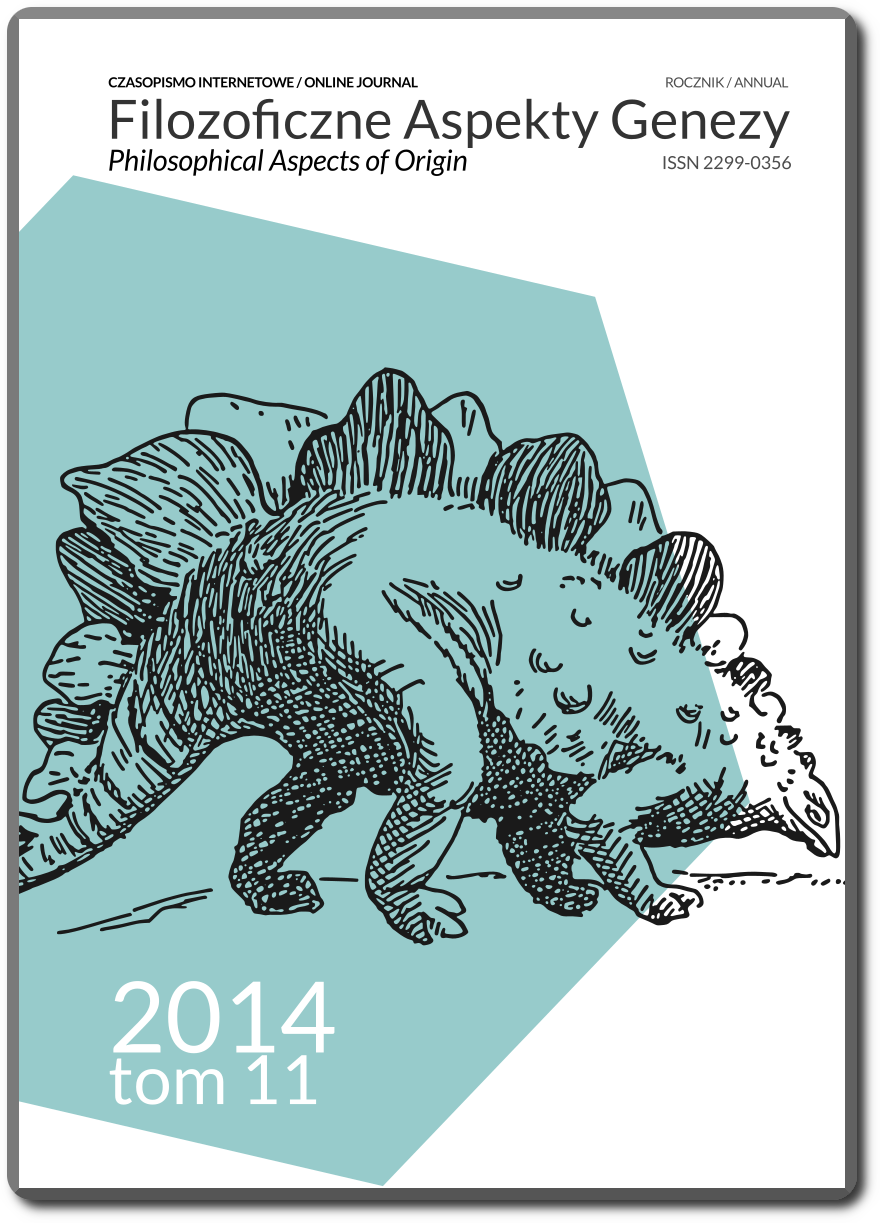Opublikowane — zaktualizowane 21.05.2021
Słowa kluczowe
- losowość ontologiczna,
- losowość epistemiczna,
- atrybuty Boga,
- wszechmoc,
- wszechwiedza
- wszechobecność,
- cel,
- władza,
- przedwiedza,
- przyczynowość ...More

Utwór dostępny jest na licencji Creative Commons Uznanie autorstwa 4.0 Międzynarodowe.
Jak cytować
Abstrakt
Dzisiejsza nauka odnotowuje liczne zjawiska, których natura wydaje się losowa. Jednakże wielu naturalistów, jak i teistów podziela przekonanie, że pojęcie losowości stoi w sprzeczności z treścią wiary chrześcijańskiej. Celem niniejszego artykułu jest wykazanie, że naukowa koncepcja losowości i tradycyjne chrześcijańskie ujęcie natury Boga są wzajemnie zgodne. Co więcej, zostanie pokazane, że nie da się naukowo rozstrzygnąć, czy w świecie przyrody losowość faktycznie występuje. Niemniej losowość zostanie zdefiniowana jako pojęcie matematyczne przydatne do właściwego interpretowania danych naukowych. Natomiast w myśl ujęcia powszechnie przyjmowanego przez teologów systematycznych natura Boga jest zgodna z obecnością zjawisk losowych w przyrodzie.
Downloads
Bibliografia
- Stover David and Erdmann Erika, A Mind for Tomorrow: Facts, Values, and the Future, Praeger Publishers, Westport, Connecticut 2000.
- Sproul R.C., Not a Chance: The Myth of Chance in Modern Science and Cosmology, Baker Books, Grand Rapids, Michigan 1994.
- Kuhn Thomas S., Struktura rewolucji naukowych, przeł. Helena Ostromęcka i Justyna Nowotniak, Fundacja Aletheia, Warszawa 2001.
- Von Neumann John, „Various Techniques Used in Connection with Random Digits”, Applied Mathematics Series 1951, no. 12, s. 36.
- Murphy Nancey, „Divine Action in the Natural Order: Buridan’s Ass and Schrödinger’s Cat”, w: Robert John Russell, Nancey Murphy, and Arthur R. Peacocke (eds.), Chaos and Complexity: Scientific Perspectives on Divine Action, 2nd ed., Vatican Observatory Publications, Rome 2000, s. 325-358.
- Gleick James, Chaos. Narodziny nowej nauki, przeł. Piotr Jaśkowski, Wydawnictwo Zysk i S-ka, Poznań 1996.
- Byl John, „Indeterminacy, Divine Action and Human Freedom”, Science and Christian Belief 2003, vol. 15, no. 2, s. 106.
- Gregersen Niels Henrik, „Laws of Physics, Principles of Self-Organization, and Natural Capacities: On Explaining a Self-Organizing World”, w: Fraser Watts (ed.), Creation: Law and Probability, Fortress Press, Minneapolis, Minnesota 2009, s. 81.
- Polkinghorne John, „The Metaphysics of Divine Action”, w: Robert John Russell, Nancey Murphy, and Arthur R. Peacocke (eds.), Chaos and Complexity: Scientific Perspectives on Divine Action, The Center for Theology and the Natural Sciences, Berkeley, California 1996.
- Ward Keith, „Why God Must Exist”, Science and Christian Belief 1999, vol. 11, no. 1, s. 5-13.
- Bartholomew David, God, Chance, and Purpose: Can God Have It Both Ways?, Cambridge University Press, Cambridge 2008.
- „Random Numbers Certified by Bell’s Theorem”, Nature 2010, vol. 464, s. 1021-1024.
- Calude Cristian S., Dinneen Michael J., Dumitrescu Monica, and Svozil Karl, „Experimental Evidence of Quantum Randomness Incomputability”, Physical Review A 2010, vol. 82, s. 022102-1-022102-8, http://tph.tuwien.ac.at/~svozil/publ/2010-qrat-j.pdf (31.03.2015).
- Polkinghorne John, Nauka i Opatrzność. Interakcja Boga ze światem, przeł. Marek Chojnacki, Wiara i Nauka, Wydawnictwo WAM, Kraków 2008.
- Atmanspacher Harald, „Quantum Approaches to Consciousness”, w: Stanford Encyclopedia of Philosophy, ed. Edward N. Zalta, Summer 2011, http://plato.stanford.edu/archives/sum2011/entries/qt-consciousness/ (01.04.2015).
- Oden Thomas C., Classic Christianity: A Systematic Theology, HarperOne, New York 1992.
- Bavinck Herman, Reformed Dogmatics, Volume 2: God and Creation, Baker Academic, Grand Rapids, Michigan 2004.
- Tomasz z Akwinu, Suma teologiczna, przeł. Pius Bełch, t. 1, Veritas, London 1975.
- Wierenga Edward, „Omnipresence”, w: Stanford Encyclopedia of Philosophy, ed. Edward N. Zalta, 2009, http://plato.stanford.edu/entries/omnipresence/ (01.04.2015).
- Bishop Robert C., „Recovering the Doctrine of Creation: A Theological View of Science”, http://biologos.org/uploads/static-content/bishop_white_paper.pdf (02.04.2015).
- Bradley James and Howell Russell, Mathematics through the Eyes of Faith, HarperOne, New York 2011.
- Weiner Jonathan, Dziób zięby, czyli jak dziś przebiega ewolucja, przeł. Monika Betley, Książka i Wiedza, Warszawa 1997.
- Pollard William, Chance and Providence: God’s Action in a World Governed by Scientific Law, Scribner, New York 1958.
- Heller Michael, Creative Tension: Essays on Science and Religion, John Templeton Foundation Press, West Conshohocken, Pennsylvania 2003.
- Św. Augustyn, „O wolnej woli”, przeł. Anna Trąbala, w: Św. Augustyn, Dialogi filozoficzne, oprac. Władysław Seńko, Wydawnictwo Znak, Kraków 1999, s. 493-649.
- Beilby James K. and Eddy Paul R. (eds.), Divine Foreknowledge: Four Views, InterVarsity Press, Downers Grove, Illinois 2001.
- Kane Robert, „Principles of Reason”, Erkenntnis 1986, vol. 24, s. 117.
- Calvin John, Institutes of the Christian Religion.
- Ewart Paul, „The Necessity of Chance: Randomness, Purpose, and the Sovereignty of God”, Science and Christian Belief 2009, vol. 21, no. 2.



